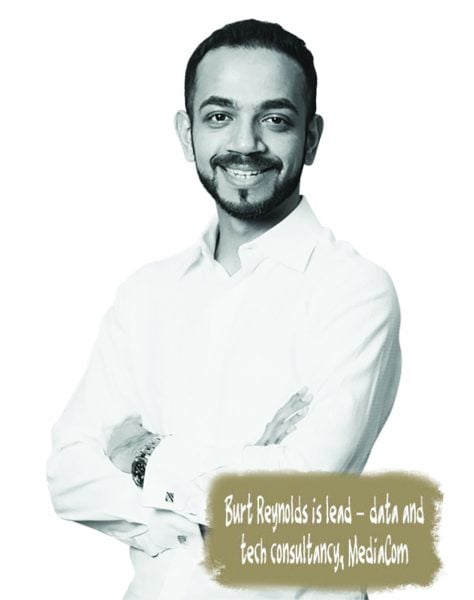 This is a new chapter in how marketing should be done in a digitally-transformed world and I am very excited to be leading this charge both personally and professionally,” said the regional marketing vice-president at one of MediaCom’s key FMCG clients in Saudi Arabia.
This is a new chapter in how marketing should be done in a digitally-transformed world and I am very excited to be leading this charge both personally and professionally,” said the regional marketing vice-president at one of MediaCom’s key FMCG clients in Saudi Arabia.
The reason I began with this assertion from a client of ours is to state the obvious. What started off as a trend has today become probably the most common buzz-phrase in marketing and agency circles: Digital transformation (DT) has hit home in KSA and in a big way.
The second highlight here is that this quote comes from a category that perceptually would be the last to jump on to any bandwagon, due to its time-tested and anecdotal ways of marketing thinking.
Yet, this is where we’ve seen the maximum shift of the cultural and marketing ethos in Saudi Arabia. This is possibly due to the predicted impact. However, in my opinion it is more because, on-the-now flattened Maslow’s hierarchy of consumer states of ‘needs-to-wants’, this is the white space where traction will be a critical driver of growth.
A clear definition of DT is in vain because it is an agile philosophy that continues to iterate.
Against the backdrop of KSA, we can simplify it in a more formulaic fashion: ‘DT is when the rate of internal organisational change is greater than the rate of external consumer change.’ On the same note, there are certain asks from marketers if they wish to accelerate on this journey. They need to make a fundamental and assisted shift in mindset, skillset and toolset.
Mindset
The main issue we’ve seen in the past year is how clients locally tend to commoditise the discipline and group it with its distant cousin, digitisation. This dilutes the spirit of what it is meant to be. Digitisation is your technological readiness to service your business, while DT has far higher external outreach and incrementality baked into it.
Transformation is also likened to evolution. This again is a disservice to the practice, as it places the capability in the hands of a few avant-garde marketing organisations. The reality on the ground in Saudi Arabia is that we’re witnessing momentum across multiple sectors, irrespective of maturity.
The last limitation is becoming obsessed with frameworks. Instead, one needs to start with short- to mid-term goals that showcase tangible business value creation to stakeholders. It makes the road less travelled a whole lot easier.
On the upside, Saudi clients are natively demonstrating the understanding that it can be a long-drawn and iterative process, one that will need handholding as they are exposed to newer models of business in their domains.
Skillset
A further challenge has been clients wanting to rapidly internalise the function without due diligence. This can be a big stumbling block, as the entire roadmap gets relegated as a cost centre and, worse, gets caught up in red tape.
To circumvent this double-edged sword, it is advisable to go in for a multi-stage engagement that spans phases of consulting expertise coupled with strategic workstream- and project-level deployment.
This build-operate-transfer model is not new and has been the cornerstone of how the software as a service (SAAS) and enterprise resource planning (ERP) platforms operate.
While this is diametrically opposed to the method some practitioners preach, Saudi clients need to view DT as a turnkey project, which necessitates a client-consultancy partnership as opposed to a scope signoff resulting
in a templatised report that sits in an inbox with little to no execution.
Toolset
This brings me closer to home and my favourite area of martech. It is an area that has seen exponential crowding from new vendors every day, each offering the Holy Grail and promising a soon-to-be-unicorn status.
DT is about having the right fundamentals in place; uncannily for clients and agency personnel, martech is an area of discord because you cannot run before you learn to walk. We need to be less heady and more pragmatic about what benefits can be leveraged from DT.
You need to audit, assess and articulate where the martech vision needs to land. Objectives and KPIs will follow automatically.
Start off with a detailed gap analysis for assessing improvement areas in the stack that you are currently operating on. This will help to methodically augment your existing infrastructure with modular technology components that are essential in delivering the desired use-cases.
In summary, there is clearly an addressable – and, more importantly, serviceable – need in the kingdom’s marketing scene for DT, with martech currently being the North Star.
The good news is that the rate of change at the consumer end of the DT story has been phenomenal, largely
due to the fast-paced adoption and adaptation by the government and private sector alike.
In turn, KSA has become a torchbearer in internalising emerging technologies, overshadowing several more established countries.
The onus is now on brands to acclimatise themselves to these new consumer ways and let marketing
lead the charge in truly designing and delivering the value proposition by focusing on the four Ps of digital transformation: platform, processes, projects and people.









